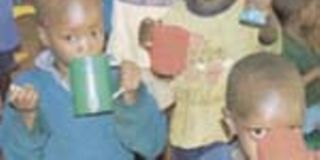Tale of the lost generation

Abandoned children eat breakfast at the Kabete Children's Home, a rescue centre near Nairobi for children who have lost touch with their families.
The boisterous mood that greets you in the hallway is exhausting.
One slight boy walks munching a crisp, as another lifts a pot left to dry and tilts it to the mouth.

Abandoned children eat breakfast at the Kabete Children's Home, a rescue centre near Nairobi for children who have lost touch with their families. Photo/ Peterson Githaiga
There is a morsel stuck at the bottom, which he peels off and throws into the mouth and laughs. The boy is mentally retarded.
But the moment the children see the flash of the camera, they swarm around the photographer with a very curious question: “Tutaenda kortini?” (Shall we go to the court?)
Reason: It is there that they are occasionally presented to press photographers in a bid to trace their parents.
Have lost touch
In spite of their deceptive cheerfulness, these are children in distress, their new home being the Kabete Children’s Home, a rescue centre for children who have lost touch with their families.
It is the only facility of its kind in the country, where children are referred either from the courts or from police stations.
In operation since 1989, and handling an average 140 children a year, the home has handled over 1,000 children.
Even as they engage in their games, unified by their blue-white uniform, these are children in crisis.
What’s remarkably distressing are the tales of pain most have to tell: A reasonably high number of parents actually know their children are at the home, but have opted not to take them back.
For instance, there is the blind boy who suffers from cerebral palsy, and who was abandoned at the Pastor Pius Muiru’s Maximum Miracle Centre off Thika Road, where the boy’s father unsuccessfully sought a miracle to restore his health.
“I have left my son to you, so carry from where I left,” read the letter from the boy’s father, recalls children’s officer at the home, Christine Ondieki.
“Please perform your miracle as I have failed?”
Two others, a dumb cheerful boy and a chubby pretty girl have been abandoned twice, while an entire family of three was left at the bus-stop in Githurai 44, Nairobi, by their mother.
“She boarded a matatu and left us there,” said the eldest boy, Mwangi. “She just left us there.”
Although the home’s capacity is 70 children, the institution holds twice that number on any day, their temporarily relief coming when institutions and homes that provide foster care, request for children.
Presently, the home holds 120 children, 68 of whom are about to be handed over to the Child Welfare Society in Nairobi’s South C.
Because of their young age, most children do not know their names or where they came from. They are given new names for use during their short stint at the home.
In foster care
But that’s not to say they all secure placement within that period: they can stay for years, such as four-year-old Omondi, who has been at the home since March 2005.
Those absorbed in foster care have to fall within the age-groups specified by the Child Welfare Society, the Little Angles and Thomas Barnados homes.




